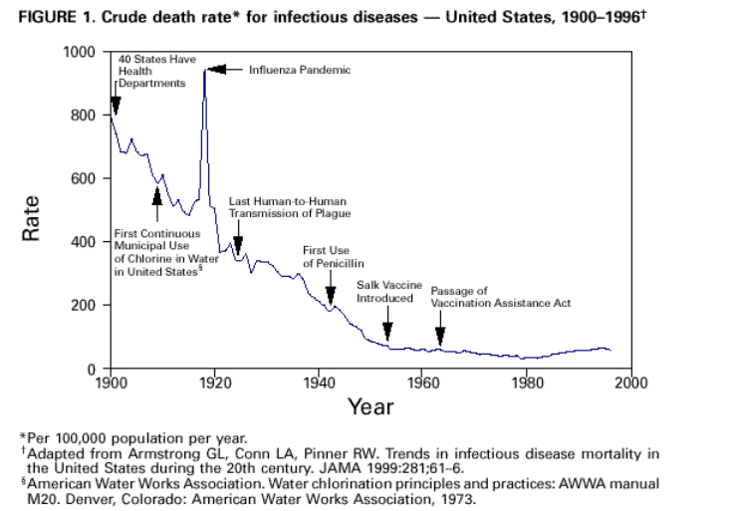Today in #SOCR381, we& #39;re going to be discussing "the limits of modern medicine" and how #SDoH contributed to the "great victory over infectious diseases." A quick thread about how this relates to #COVID19
Although medical advancements often receive credit for the dramatic decline in deaths due to infectious diseases during the 19th century. This decline was already taking place prior to vaccinations or antibiotic use.
So, why did deaths from infectious diseases decline in the 19th and 20th century if it was not due to medical advancements??
It was due to improved sanitation, nutrition, and housing as well as other changes to the environment! In other words, the social determinants of health
It was due to improved sanitation, nutrition, and housing as well as other changes to the environment! In other words, the social determinants of health
How is this related to #COVID19?
As @edyong209 states eloquently, "A pandemic can be prevented in two ways: Stop an infection from ever arising, or stop an infection from becoming thousands more. The first way is likely impossible" https://www.theatlantic.com/magazine/archive/2020/09/coronavirus-american-failure/614191/">https://www.theatlantic.com/magazine/...
Among other things, the very nature of our infrastructure has contributed to the spread.
Nursing homes, prisons, and the meat-packing industry were some of the hardest hit by #COVID19. It is no coincidence that these places are densely populated by marginalized folks.
Nursing homes, prisons, and the meat-packing industry were some of the hardest hit by #COVID19. It is no coincidence that these places are densely populated by marginalized folks.
But, as we see for nearly all health conditions, #COVID19 cases are clustered in specific communities and neighborhoods around the US.
The same is true for Indy: https://iu.maps.arcgis.com/apps/opsdashboard/index.html#/a45b671b0db245aeaba3cac638f92fad">https://iu.maps.arcgis.com/apps/opsd...
The same is true for Indy: https://iu.maps.arcgis.com/apps/opsdashboard/index.html#/a45b671b0db245aeaba3cac638f92fad">https://iu.maps.arcgis.com/apps/opsd...
If you take a look at #COVID19 maps, you& #39;ll note a striking similarity to redlining maps of Indy https://www.indystar.com/in-depth/news/environment/2020/05/02/redlined-indianapolis-areas-still-see-poverty-poor-health/3017810001/">https://www.indystar.com/in-depth/...
To be continued after class...
Here are some articles articulating the connection between institutional racism, redlining, and #COVID19 https://theconversation.com/is-your-neighborhood-raising-your-coronavirus-risk-redlining-decades-ago-set-communities-up-for-greater-danger-138256">https://theconversation.com/is-your-n...
https://www.vox.com/2020/7/10/21319873/covid-19-coronavirus-cases-deaths-black-americans-housing-segregation">https://www.vox.com/2020/7/10...
https://www.chicagotribune.com/coronavirus/ct-racism-black-chicago-coronavirus-covid-20200512-wtnn4hchc5bqrjrbpityuqzocy-story.html">https://www.chicagotribune.com/coronavir...
https://www.brookings.edu/blog/the-avenue/2020/04/16/mapping-racial-inequity-amid-the-spread-of-covid-19/">https://www.brookings.edu/blog/the-...
Want to make this local? The @IndianaHistory has a series of virtual conversations as part of the Living the Legacy series that just so happens to address these issues: https://indianahistory.org/events/rethinking-redlining-segregation-prologue-to-the-covid-19-crisis/">https://indianahistory.org/events/re...
In particular, on Sept. 27th, Unai Miguel Andres, Paul Mullins, and Wildstyle Paschall will be exploring "what redlining looks like here in Indianapolis, considering history, demographics, and memory." https://indianahistory.org/events/living-the-legacy-making-it-local/">https://indianahistory.org/events/li...
All of this is to say, if you want to understand disparities in #COVID19 infection rates and deaths, then you *must* move past individual explanations (e.g., who has a pre-existing condition) and look at structural conditions. Disease risk and exposure is socially-patterned!

 Read on Twitter
Read on Twitter


